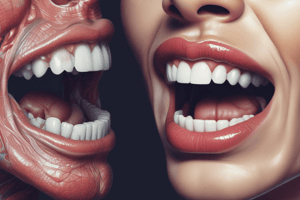Podcast
Questions and Answers
Which term describes the process of breaking down food into smaller molecules?
Which term describes the process of breaking down food into smaller molecules?
- Mechanical Digestion
- Ingestion
- Propulsion
- Digestion (correct)
What is the primary function of the digestive system?
What is the primary function of the digestive system?
- Produce hormones for growth
- Filter waste products from the blood
- Break down ingested food into absorbable nutrients (correct)
- Transport oxygen to the cells
Which term refers to the movement of food along the alimentary canal?
Which term refers to the movement of food along the alimentary canal?
- Propulsion (correct)
- Digestion
- Mechanical Digestion
- Ingestion
What is the role of mechanical digestion in the digestive process?
What is the role of mechanical digestion in the digestive process?
Which part of the digestive system consists of the gastrointestinal tract and accessory digestive organs?
Which part of the digestive system consists of the gastrointestinal tract and accessory digestive organs?
What is the main function of Incisors among the types of teeth mentioned?
What is the main function of Incisors among the types of teeth mentioned?
Which type of teeth is specialized in tearing food?
Which type of teeth is specialized in tearing food?
What is the function of Premolar teeth as described in the text?
What is the function of Premolar teeth as described in the text?
Among the mentioned types of teeth, which one is specifically designed for chewing and grinding food?
Among the mentioned types of teeth, which one is specifically designed for chewing and grinding food?
Which type of teeth is responsible for crushing and grinding food among those listed?
Which type of teeth is responsible for crushing and grinding food among those listed?
What is the function of the sublingual gland?
What is the function of the sublingual gland?
When do milk teeth start growing?
When do milk teeth start growing?
What type of teeth are replaced by permanent teeth?
What type of teeth are replaced by permanent teeth?
Where are the accessory digestive organs located?
Where are the accessory digestive organs located?
What is the purpose of the palat at war?
What is the purpose of the palat at war?
How many milk teeth does a child typically have?
How many milk teeth does a child typically have?
What is the total number of permanent teeth in a normal adult dental formula?
What is the total number of permanent teeth in a normal adult dental formula?
Which teeth are typically called incisors in dental terminology?
Which teeth are typically called incisors in dental terminology?
What is the function of the tongue in the human body?
What is the function of the tongue in the human body?
Which part of the tongue is composed of skeletal muscles?
Which part of the tongue is composed of skeletal muscles?
Which mesentery attaches the transverse colon to the posterior abdominal wall?
Which mesentery attaches the transverse colon to the posterior abdominal wall?
What is the function of a peritoneal ligament?
What is the function of a peritoneal ligament?
Which structure links the liver to the anterior abdominal wall?
Which structure links the liver to the anterior abdominal wall?
What is the function of the meso-appendice?
What is the function of the meso-appendice?
Which structure attaches the duodenum to the posterior abdominal wall?
Which structure attaches the duodenum to the posterior abdominal wall?
Study Notes
Dental Formula and Teeth
- Molar clawing and grinding is a dental formula consisting of 2 (Incisors), 1 (Canine), 2 (Premolars), and 2 (Molars) for milk teeth, and 2, 1, 3, and 3 respectively for permanent teeth.
- Permanent teeth consist of 32 teeth, which include 8 Incisors, 4 Canines, 8 Premolars, and 12 Molars.
Tongue
- The tongue is a muscular organ composed of skeletal muscles and covered with mucus membrane.
Digestive System
- The digestive system is a complex physiological system responsible for the mechanical and chemical breakdown of ingested food into absorbable nutrients.
- The digestive system consists of the gastrointestinal tract (alimentary canal) and accessory digestive organs.
Processes of Digestion
- Ingestion: the process of taking food into the alimentary canal.
- Propulsion: the process of mixing and movement of food along the alimentary canal by the alternating contraction and relaxation of smooth muscle in the GIT walls.
- Digestion: the breaking down of food into smaller molecules, which can be mechanical or chemical.
Types of Teeth
- Incisors: responsible for biting food.
- Canines: responsible for tearing food.
- Premolars: responsible for chewing and grinding food.
Salivary Glands
- Parotid gland: produces serous saliva (watery).
- Sublingual gland: produces mucous saliva.
- Submandibular gland: produces both serous and mucous saliva.
Other Digestive Organs
- Mesentery: a double layer of peritoneum that attaches the small intestine to the posterior abdominal wall.
- Meso-Appendix: a mesentery that attaches the appendix to the posterior abdominal wall.
- Transverse mesocolon: a mesentery that attaches the transverse colon to the posterior abdominal wall.
- Meso-Duodenum: a mesentery that attaches the duodenum to the posterior abdominal wall.
- Peritoneal ligaments: formed by the peritoneum, which links organs to each other and to the abdominal wall.
Studying That Suits You
Use AI to generate personalized quizzes and flashcards to suit your learning preferences.
Description
Test your knowledge on the structure and function of teeth and salivary glands. Learn about the different types of teeth, functions of sublingual and parotid glands, and the process of dentition. This quiz covers key concepts in human anatomy related to digestion.




